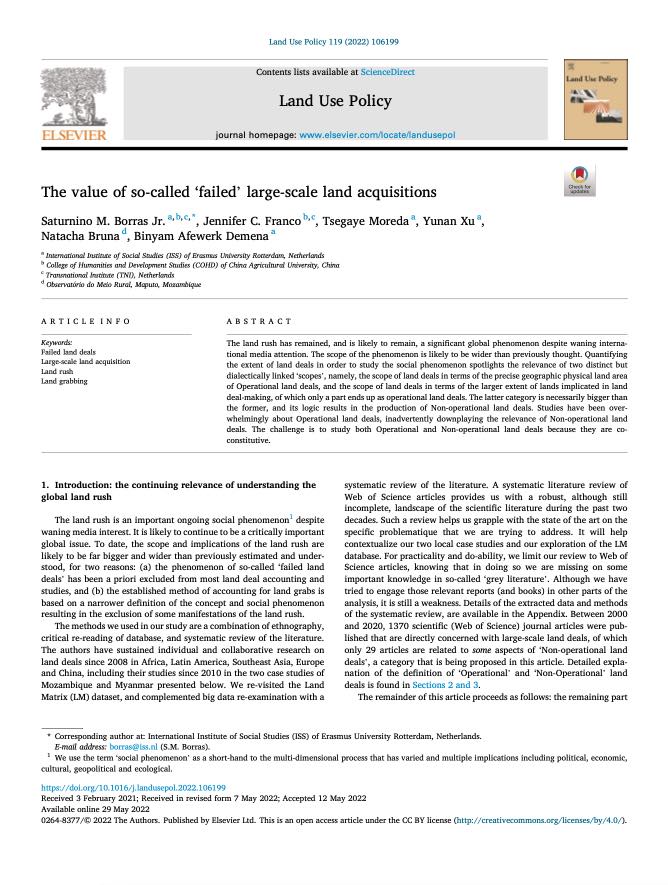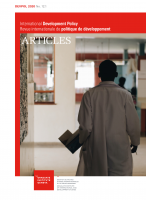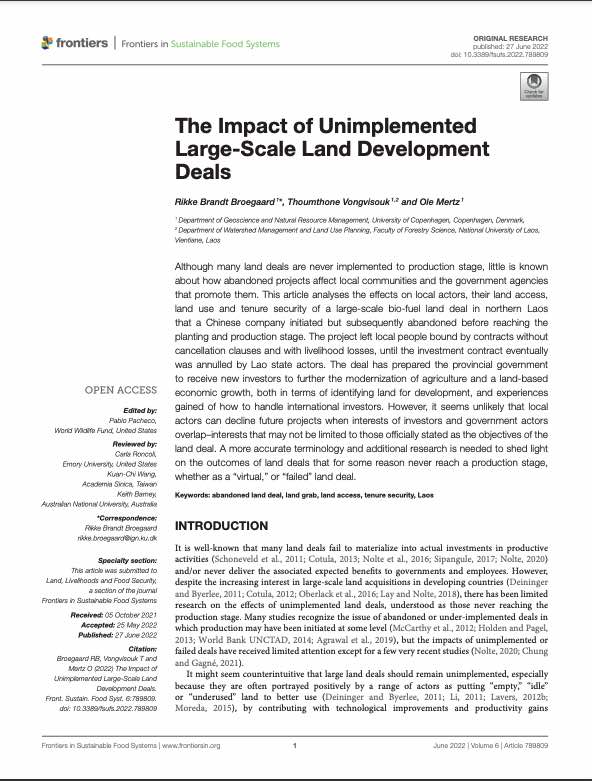This blog post is part of the series What to Read.
After the “land rush” in 2007/08, researchers and civil society investigated the speed and scale of this phenomenon or highlighted single case studies. 15 years on, communities who lost their homes in the land rush continue to fight for their rights and get support from civil society, international organizations, and the media.
But what about the adverse impacts of unimplemented land deals and related struggles that were canceled by investors or, oftentimes, by governments? Grain shows in its report “Failed Farmland Deals” that projects which failed or never materialized peaked in 2010 but have been on the rise again since 2017.
This topic is gaining increased attention. The third analytical report by Land Matrix dedicates a whole section to failed land deals which are most prevalent in West and East Africa, often related to jatropha crop projects for biofuel production. Reasons for failed land deals vary, ranging from miscalculation, misjudging the realities on the ground, or mismanagement.
Often we wrongly assume that in the case of failed or canceled agribusiness and forestry projects, the land is automatically returned to its previous owners or users. In fact, communities may not only face a lack of political will in some cases but also lasting changes. Oftentimes, land deals also go along with an irreversible change of the land use category or the land may be transferred to the State before the contract is concluded.
For this What to Read digest, I reviewed four recent articles that offer insights into an underexplored issue and its related conceptual challenges. The literature presented here ranges from more general perspectives to specific case studies in Laos, Zambia, Senegal, and Tanzania. If you are interested in or researching large-scale land acquisitions, this digest is for you!
Sign up here to receive this digest in your mailbox
Publications reviewed in this issue:
-
The value of so-called ‘failed’ large-scale land acquisitions
- Caught in the Web of Bureaucracy? How ‘Failed’ Land Deals Shape the State in Tanzania
- The Impact of Unimplemented Large-Scale Land Development Deals
- Understanding Land Deals in Limbo in Africa: A Focus on Actors, Processes, and Relationships
The value of so-called ‘failed’ large-scale land acquisitions
By Saturnino M. Borras Jr., Jennifer C. Franco, Tsegaye Moreda, Yunan Xu, Natacha Bruna and Binyam Afewerk Demena, 2022

This piece is an intriguing addition to the under-researched aspects of the land rush phenomenon by bringing attention to non-operational land deals. Drawing on the Land Matrix database and a literature review the authors not only quantify existing failed land deals but also explore their production and impact. In addition to conceptualizing non-operational deals - which they critically point out are not always failed land deals - the paper uses Myanmar and Mozambique as case studies.
Borras et al. start out by looking into the core of land deals, namely that investors and governments are equally prone to “speculation and spectacle”. Based on the literature review, the authors point out that spectacular-but-true promises of the abundance of land, its emptiness, and the availability of cheap labor, low costs, and tax-holidays drives investments in land deals at a large scale. At the same time, agronomic aspects including soil quality and water quantity tend to be overlooked or prospectors fall for often unproven promises of certain crops, such as jatropha, that have caused numerous failed land deals. In other cases, the supposedly “un-used” or “empty” land has turned out to be contested.
In a second step, the paper takes a closer look at the consequences of non-operational deals, with emphasis on property relations, labor, benefit distribution, consumption, social reproduction, and ecology. First, they argue that the access to and control over land changes in the wake of a land deal which may pose various challenges after the withdrawal or scaling down of the project. Second, from an ecological perspective, Borras et al. highlight that non-operational land deals may have already caused damage or changed the conditions of the land.
Third and fourth, the socio-economic and the institutional impact on both formal and informal or customary tenure remain rather sketchy. The most important take away here is that certain lands are already designated for investments and thus previous users or owners may not be able to return even after the land deal has failed or proven to be non-operational.
Concluding, the paper calls for a “two-tier” method of accounting for global land deals to fully understand the causes and impact of the global land rush.
Caught in the Web of Bureaucracy? How ‘Failed’ Land Deals Shape the State in Tanzania
By Sina Schlimmer, 2020

This original qualitative study investigates failed land deals or projects with unexpected results in Tanzania. Schlimmer argues that the terminology of failure is problematic as the conceptual or methodological criteria often remain undefined. Understanding land deals as the implementation of pro-investment land policies, the author uses the policy failure approach as an entry point for this concept to explore political transformation and administrative resistance, for example. Based on field work in Tanzania, the article compares two not fully implemented biofuel projects.
In her analysis, Schlimmer explores how failed land deals make space for bureaucratic and political power renegotiations and the consolidation of civil society stakeholders. Its emphasis on the transformational changes and opportunities of failed land deals sets this publication apart from other studies in the field. Specifically, the article takes a closer look at the preceding months and the aftermath of the withdrawal of investors. Both cases exemplify that the Tanzanian State “is at work” in making and implementing the country’s land investment policies.
As the author highlights, this has translated into new administrative procedures at district level for future land deals in one case, while in the other case, Tanzania’s national government demonstrated its ability to resist international land grabs and underlined its authority by fulfilling an electoral promise to nullify land investment transfers that have not met the contractual agreement.
The Impact of Unimplemented Large-Scale Land Development Deals
By Rikke Brandt Broegaard, Thoumthone Vongvisouk, and Ole Mertz, 2022

This paper provides differentiated insights into the effects of projects that never reached the stage of implementation on local communities. The authors specifically explore the impact on land access, land use, and tenure security, and analyze the used terminology. Looking into what turned out to be a virtual Chinese land investment in Laos, Brandt Broegaard et al. use a longitudinal approach to understand the local effects. Field work was conducted both in villages where contracts were signed but the project never got implemented as well as a village which has served as a pilot area for biofuel production.
The paper attempts a rather nuanced analysis of abandoned, failed, and unimplemented land deals and the reasons behind. Although not going into much detail regarding tenure security, it argues that the used terminology may conceal the lasting negative consequences for livelihoods or intensifying power struggles. At the same time, speaking of failure overlooks the non-productive, often unrevealed, motivations of land deals, such as political aspirations, personal benefits, or realizing (national) political and economic visions.
Even though the biofuel plantation plans have never been fully implemented and the local population even regained access to their land, Brandt Broegaard et al. highlight that the land deal enabled the long-term expansion of state influence into the area. Once land has been earmarked for certain land-related investments or modernization affected villages will likely face new deals in the future. They also point out that the newly gained experience of the provincial government of how to initiate and manage international investments will help to invite and attract new investors. Concluding, one of the key questions for future research remains how local actors will respond to second-round investment projects.
Understanding Land Deals in Limbo in Africa: A Focus on Actors, Processes, and Relationships
By Youjin B. Chung and Marie Gagné, 2021
 This publication serves as an introduction to a collection of articles published in the African Studies Review. It discusses the implications of as well as the question through what actors, processes, and relationships land deals become stalled or partially implemented. The introduced articles draw on long-term, in-depth ethnographic research of land deals in Senegal, Tanzania, and Zambia. Chung and Gagné’s contribution adds to a more critical view on the different experiences of failed land deals. In doing so, their intervention demands a better understanding of the social and political dynamics of what they call “land deals in limbo” in African countries.
This publication serves as an introduction to a collection of articles published in the African Studies Review. It discusses the implications of as well as the question through what actors, processes, and relationships land deals become stalled or partially implemented. The introduced articles draw on long-term, in-depth ethnographic research of land deals in Senegal, Tanzania, and Zambia. Chung and Gagné’s contribution adds to a more critical view on the different experiences of failed land deals. In doing so, their intervention demands a better understanding of the social and political dynamics of what they call “land deals in limbo” in African countries.
In addition to introducing the articles, the editors present three main arguments related to the failure of land investments.
Firstly, Chung and Gagné point out that de jure land acquisitions and de facto control over land are two pairs of shoes. Research around land governance and investments in many African countries have shown that matters of land transfers, usage, and possession are complex and ambiguous. In such an environment, investors face numerous challenges which may result in partial development of the land.
Secondly, the authors argue that shedding light on resistance against land deals is pivotal in understanding why land deals fail. Apart from the often-debated opposition of local residents, Chung and Gagné highlight the opportunities land deals may create for landless migrants or local elites, i.e. to occupy land concessions or sell plots within these.
Thirdly, they argue that the misappropriation of funds or unrealistic aspirations of investors are a result of contradictions within capitalism. This in turn may lead to financial problems that hinder the implementation of the land investment project as originally planned.

